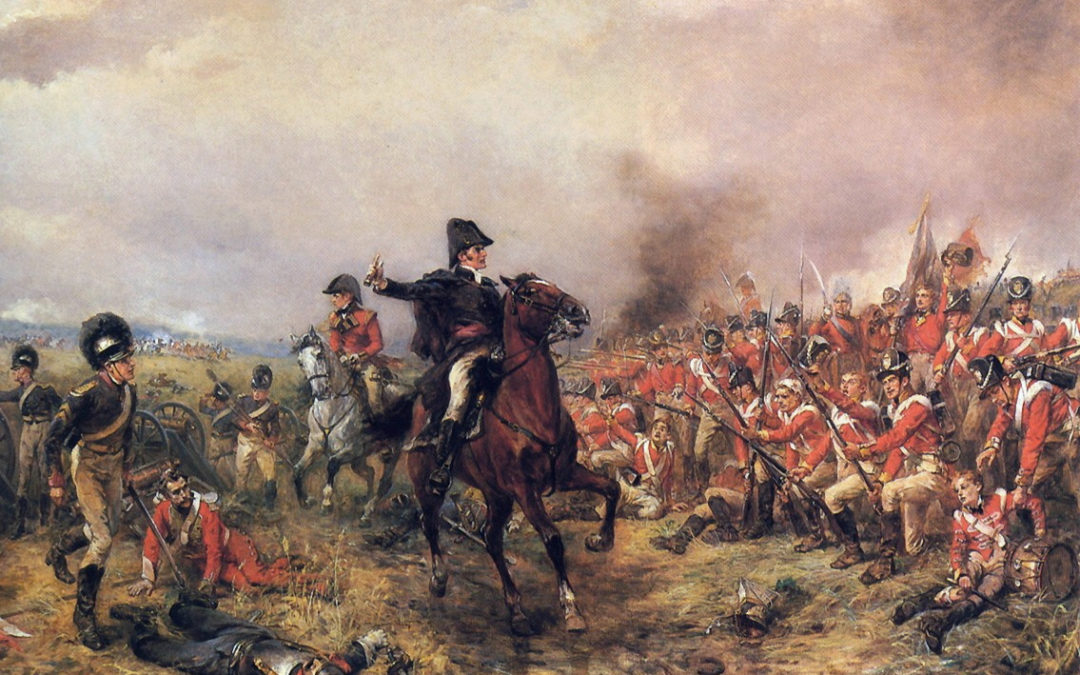We’re coming up to the anniversary of the Battle of Waterloo on 18 June. I’ve written a book which climaxes at Waterloo: Burke at Waterloo. It’s a lot of fun and also gives you a useful summary of the events leading up to Waterloo and the battle itself. According to the mysterious laws of promotional blogging, because I’ve written this book I now have to write about the history. The problem is that the anniversary of Waterloo comes round every year and I covered it quite thoroughly last year.
It’s impossible, though, to ignore Waterloo completely. This weekend we may well end up going to the special events at Wellington’s London home, Apsley House. For those more adventurous, there is an annual re-enactment every year at Waterloo. This year it will be next weekend (22-23 June).
Why do the British get so excited about Waterloo? I was once talking about this to a French army officer who suggested that the French really were not interested in Waterloo, but were more enthusiastic about Austerlitz. There is no doubt that nations do tend to remember the battles they won, but Wellington won a lot of battles in the Peninsula and their anniversaries pass by with hardly any commemoration at all.

Field at Waterloo from the top of the Lion’s Mound
Waterloo holds a place in British history which is completely disproportionate to its actual military importance. Bloody as it was, it was far from the bloodiest battle of the Napoleonic wars, and the British have always overstated its strategic significance. In truth, the era of Napoleon had ended the previous year with the fall of Paris and the Emperor’s exile to Elba. Waterloo was rather a sad coda to the story of French military supremacy in Europe.
Waterloo, though, was a decisive victory which could be presented as a uniquely British achievement. (It wasn’t – fewer than half of those fighting Napoleon were British). Britain had been central to the struggle against Napoleon, bankrolling the armies of other states across Europe and maintaining control of the seas. It was only at Waterloo, though, that the British Army directly engaged French forces on the main front of the war. The battle cemented Britain’s position as one of the leading powers of Europe with a decisive influence in the settlement of the continent after the Allied victory.
For 200 years following Waterloo Britain saw itself as arguably the most important military and political power in Western Europe. This was not a view that would have been shared by other countries and its effects were not always positive. For example, some commentators consider that it was victory at Waterloo that convinced the British that they did not need the sort of military reforms that were seen in, for example, Prussia. The failure of the British army to adapt to the new forms of warfare that were emerging in the 19th century was a contributing factor to the disaster of the Crimean War. Yes, we were on the winning side, but militarily the campaign did not reflect well on the British Army. British soldiers behaved heroically, but their leadership let them down time and time again, not only in well-publicised disasters like the Charge of the Light Brigade but in less high profile – though arguably more significant – failures in supply and communications.
Politically, too, the myth of British exceptionalism, of which Waterloo was a significant element, has often damaged our relationships with the rest of Europe, culminating in the rejection of continuing EU membership. For better or worse, the reverberations of Waterloo continue to resonate more than 200 years later.
We are probably right to remember Waterloo. It marked the end of an era. What historians call “the long 18th century” ended on that bloody field just south of Brussels. The world was, indeed, never quite the same again – but the changes that we were to see in the 19th century were probably inevitable anyway. The growth of industrialisation, the increase in the franchise, the rise of the middle classes, the dramatic changes brought about by improvements in transport (notably the railways) and communication (like the electric telegraph) – all these things would almost certainly have happened whoever had won at Waterloo. 18 June, 1815, though, is one of those milestones in history. The journey does not radically change as we pass a milestone, but it is the milestones that remind us where we are.
If you have the chance this weekend or next, it’s worth thinking about that milestone and how the world has changed since and, perhaps, how we want it to change in the future.
Burke at Waterloo
Of course, you could commemorate the battle by reading my book. Burke at Waterloo starts off as a straightforward spy story. Burke is in Paris to foil an attempt on the Duke of Wellington’s life. (Yes, there really were attempts on Wellington’s life.) Burke’s pursuit of the Bonapartist spy leading plot takes him to Brussels with a climax at Waterloo. Military history enthusiasts are likely to enjoy the details of the Battle of Waterloo and of the (nowadays sadly neglected) Battle of Quatre Bras two days earlier. Everybody else can just relax and enjoy the spy story.
Burke at Waterloo is available on Kindle or in paperback. In the USA it is also distributed by Simon & Schuster.
Image at top of page is Wellington at Waterloo by Robert Hillingford

